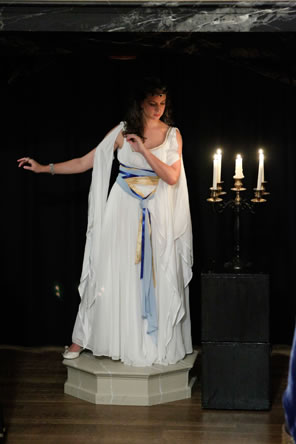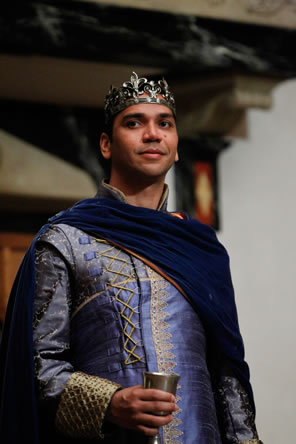The Winter’s Tale
Trust the Bard, for His Magic Is True
American Shakespeare Center, Blackfriars Playhouse, Staunton, Va.
Saturday, April 28, 2012, E–1&2 (left stalls)
Directed by Jim Warren

Stephanie Holladay Earl holds the pose as Hermione's statue in The Winter's Tale at the Blackfriars Playhouse. Below, Eugene Douglas as Lenotes. Even in the trial scene, bloodied and bedraggled, Earl’s Hermione held forth with true courage and a pride that stood up to the pompous, cloak-whipping manners of Douglas's Leontes, who relied on volume over evidence to make his truth the only valid one. Photos by Tommy Thompson, American Shakespeare Center.
The Winter’s Tale is a tricky play to pull off. It’s a play of mystery and mysticism, but there is more mystery in the play’s composition and structure than in its plot and presentation. Did Shakespeare really know what he was doing when he wrote this play? When he so abruptly and without clear motive sent Leontes into a fit of jealous rage? When he killed off a queen—Leontes visits the body—but apparently did not really kill her off (literature’s greatest red herring)? When he turned the heaviest of tragedies into the lightest of comedies within a half minute of stage time? This seems the work of an amateur scriptwriter, not the world’s greatest playwright in the evening of his career.
Ah, but there is genius in this work, and it fully emerged in the ASC’s production at The Blackfriars, revealed not only in wonderful performances but, perhaps more importantly, through director Jim Warren’s academic alchemy.
It’s easy to overlook Warren’s significant contributions to the Blackfriars’ presentations. No sets and no effects mean no overarching directorial concepts. Tthe productions focus solely on the texts, and the only extratextual conception is in the costuming, in this instance Erin M. West’s fairy tale extravagance of a medieval Sicily and rustic Bohemia. That almost one-fourth of the Blackfriars’ year-round calendar features productions without directors and designers (the Actors’ Renaissance Season) further seems to diminish the director’s stature at the ASC.
But the actors here will tell you how important Warren has been for them in gleaning from their lines not only their characters’ behaviors but also the subtlest shadings of their characters’ personalities. These productions may be textcentric, but it is Warren who so astutely grasps the nuances in these texts and allows their own relevant concepts to guide the production.
In the case of The Winter’s Tale, rather than try to apply logic to the play’s strange, sudden-wrought turns, Warren and his company put their full faith in Shakespeare’s method. Thus, trusting The Bard, we realize Leontes’ plunge into jealousy is not so abrupt. In Eugene Douglas’s portrayal of the Sicilian king, we could already see a streak of petulance (inherited by his son, Mamillius, by the way) inherent in the lines. Instead of greeting Hermione’s news that she has won the stay of old friend Polixenes with a “you do well, lady,” his immediate reply is “At my request he would not.” Then he dangles his insecurities before her as he says she has “never spok’st to better purpose…but once,” and then riddles her along until he clarifies that “but once” as when she agreed to marry him. That she doesn't immediately grasp his riddle obviously bothers him. All of this, comprising more than 20 lines, comes before his notorious “Too hot, too hot” shift into unquenched jealous rage.
It worked, in and of itself: no slow motion, no sound cues, no light effects. No overly flirtatious Hermione, and no winking Polixenes, either. We don’t need further reason for Leontes to suspect his wife and best friend; in his own context, his “Too hot, too hot” is true though his reason be false, and that is merely humanity. Shakespeare here, and as the subsequent scenes transpire, skillfully draws a portrait of tyranny. It was there all the time in Leontes, and Shakespeare suggests it is there in all men and women (further demonstrating it in Polixenes and, to some degree, in Paulina).
The conundrum of tyranny is that it is blind to its own tyranny, even though obvious to everyone else. While Leontes’ behavior makes no sense to Camillo or the other courtiers, no logic or hard evidence or even a god’s oracle can penetrate his delusion. Shakespeare in the first half of The Winter’s Tale is holding up a window to the true nature of dictatorship, even in a kingdom where the rule of law supposedly holds sway. Look at today’s headlines, here and everywhere. How much more relevant can any director’s superimposed concept be?
Enhancing Leontes’ effective portrayal of this theme, ironically, is in the hands of the actress playing Hermione. Stephanie Holladay Earl unlocked inestimable treasures in her portrayal of the Sicilian queen. Courtiers and audiences alike cannot help adoring this woman, her natural charm, her stunning beauty, her keen wit, her intelligent bearing, her smile. Even in the trial scene, bloodied and bedraggled, Earl’s Hermione held forth with true courage and a pride that stood up to the pompous, cloak-whipping manners of Douglas's Leontes, who relied on volume over evidence to make his truth the only valid one. Only the death of his son, coming at the exact moment he defied the oracle, could shake his resolve, and once shaken, he finally and fully melted when he saw his celestial Hermione, loved by all the world, crumble to earth.
 Because Douglas’s Leontes was so human, because Earl’s Hermione was so angelic, Paulina’s roar that the queen was dead played out as the deepest of Shakespearean tragedy. Bridget Rue’s Paulina out-woa’d Lear in the effect she left on not just the king and courtiers but the audience, too. This could very well have ended the play and left us emotionally spent (when, in fact, we haven’t yet reached the intermission), but there was worse to come. Antigonus must abandon the baby girl, Perdita, on a wild plain, and then he is eaten by a bear even as his shipmates drown in a wreck.
Because Douglas’s Leontes was so human, because Earl’s Hermione was so angelic, Paulina’s roar that the queen was dead played out as the deepest of Shakespearean tragedy. Bridget Rue’s Paulina out-woa’d Lear in the effect she left on not just the king and courtiers but the audience, too. This could very well have ended the play and left us emotionally spent (when, in fact, we haven’t yet reached the intermission), but there was worse to come. Antigonus must abandon the baby girl, Perdita, on a wild plain, and then he is eaten by a bear even as his shipmates drown in a wreck.
And boom! one line later, the old Shepherd (Ronald Peet) is doing a stand-up comic’s routine on how much better life would be if boys would sleep continuously from age 10 to 23 instead of getting into trouble.
Rebirth is at hand: that tragic play called The Winter’s Tale is done and the comic piece known as The Winter’s Tale has begun, even though the bear is still at his dinner. Warren and his cast don't attempt to smooth over these transitions but trust that Shakespeare had reason to not only juxtapose his comedy with his tragedy but intermingle them, line to line: Rue’s Paulina drew laughs when she cowed Leontes’ courtiers during his tyrranous rage in Act 2, and Polixenes’ sentence of torture and death on the old Shepherd and Perdita, as delivered by Patrick Earl as the Bohemian king, was a true stroke of terror come amid the festivities of Act 4. Warren has grasped all the minutest tricks Shakespeare used to wring out every ounce of emotional response a thinking human can emote during two hours’ traffic on the stage; in this Winter’s Tale you literally cry, then laugh, then cry, then laugh, then finally cry and laugh together when Hermione’s statue comes to life.
Aside from his close scrutiny of the text, Warren made some production choices that paid off well, too. As this was ASC’s 11-member tour troupe (ending its travels with a two-month residency at the Blackfriars), it had no child actor to play Mamillius. Instead, Denice Mahler, who also played Perdita, was cast as the prince. Aside from providing the genetic resemblance to his sister, this Mamillius knew exactly how to react and respond to Leontes’ first and vitally important speech of jealous rage. By extension, this helped guide the audience in appreciating the full measure of the king’s cementing delusion, something lost when a cute kid is merely reciting lines. Playing Autolycus was another ASC vet, Jake Mahler, a talented musician experienced in impishly interacting with the close-in Blackfriars’ audience. He was ideally suited to make this unabashed rogue the charmingly comic character Shakespeare intends him to be. Finally, it’s not ASC (or Shakespeare, for that matter) without the interposition of live, contemporary music into the proceedings, so we get a rendering of the Dirty Dancing finale danced by the entire cast during the sheep-shearing feast to “(I’ve Had) The Time of My Life.”
Life, over time, is full of joyful tidings and tragic turns, laughter and tears, hopes and despairs, births, deaths, and rebirths. Shakespeare’s audacity was jamming it all into one play, a tragedy and comedy he abtrusely titled The Winter’s Tale. Warren and the ASC touring troupe’s accomplishment was trusting that Shakespeare’s Tale was true life and letting it work on us.
Eric Minton
May 2, 2012
This review also appears on PlayShakespeare.com
Comment: e-mail editorial@shakespeareances.com
Start a discussion in the Bardroom



 Find additional Shakespeareances
Find additional Shakespeareances